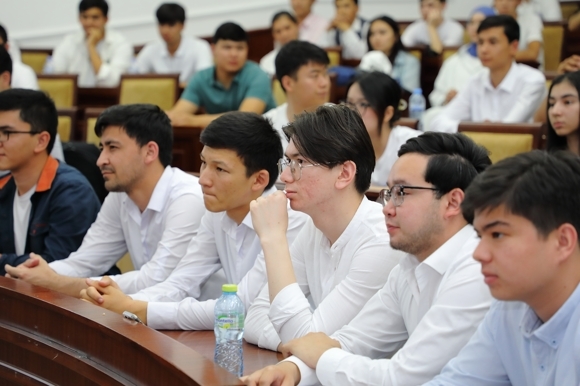Mr. Mukae, General Director of Coca-Cola Uzbekistan, spoke at Live Dialogue.

Today, we held a Live Dialogue event with Mr. Kazumasa Mukae, General Director of Coca-Cola Uzbekistan, as our guest speaker. The event was moderated by Nargiza, a JICA expert working at the Uzbek-Japan Innovation Center of Youth. The event took place in the Auditorium on the first floor of UJICY and attracted a large number of participants, including researchers from UJICY, students from Tashkent State University of Engineering and Technology, and students from the National University of Uzbekistan, with some attendees standing throughout the event.
Mr. Mukae Kazumasa began his career at a Japanese trading company, then worked as a consultant at a management company, and later served as President of Coca-Cola's Japan and Korea offices. Since last autumn, he has been active as General Director at Coca-Cola in Uzbekistan.
At the beginning of the Live Dialogue, Mr. Mukae shared his experiences from his university days backpacking and his career path, followed by a message to the participants: “Unlock the Potential of Business, Teams, and Individuals… through the Power of Leadership.”
The event proceeded with Mr. Mukae answering questions from Nargiza experts and participants. Even after the scheduled end time, participants continued to raise their hands, and ultimately 13 researchers and students asked Mr. Mukae questions. This article highlights some of the most memorable questions and Mr. Mukae's answers.
Q: What is necessary for students and researchers to become future leaders?
A: Above all, a mindset is essential. Within that mindset, there are three key elements.
The first is to avoid a fixed mindset, where you blame others or your environment when things don't go well, and instead adopt a growth mindset, where you believe that your talents and abilities can be improved through experience and effort. The second is to have leadership habits, and the third is to have a customer-centric mindset. Coca-Cola is always supported by its customers, and we constantly think about how we can add value for them.
Q: How can we enhance creativity among young researchers and organizations and generate innovation?
A: Creativity comes from paying attention to things that upset you or cause you trouble in your daily life and thinking about how to solve them. If you are satisfied with your life, you will not be creative. Companies that are successful in innovation do not start with technology, but with people's issues and why they are issues.
Q: How do you deal with competing manufacturers?
A: We ask questions such as, “Why did customers choose the competitor's product? Was it because of the price? Or was it because of advertising?” We then analyze the answers. Customer behavior is always correct, so it is important to first consider why they made their choice.
Q: Water is essential for manufacturing beverages. How do you view water resources?
A: We are particularly focused on water conservation in Uzbekistan, where we are collaborating with the UNDP and addressing the Aral Sea water issue. We have also introduced renewable plastic bottles. Companies have a social responsibility to conserve water and be environmentally conscious.
Q: What is Coca-Cola's vision in a single phrase?
A: “Refresh the World, Make a Difference.” People choose different beverages depending on the time of day or season, but Coca-Cola aims to create small moments of happiness through beverages. As a total beverage company, Coca-Cola provides a wide range of products, including cola, juice, coffee, and alcohol, and values offering consumers choices.
Q: What is necessary for a company to grow globally?
A: Setting a clear vision and values. It is important to share clear goals, objectives, and a vision of success with the team. Additionally, since teams include people with different values and backgrounds, establishing shared values is essential for a company's global expansion.
Q: How do you think about your career? How can I build a career like Mr. Mukae's?
A: First, find what you are good at. By pursuing what you are good at, you can build a unique career. Rather than thinking about what you need to improve to become a certain type of person, focus on finding what you are good at.
Q: How were IQ and EQ important for Mr. Mukae when he faced difficult challenges?
A: I feel that both IQ and EQ are important. With IQ, it is especially important to ask the right questions. This is because in university, professors ask students questions and students answer them, but in the real world, you have to ask questions and solve problems yourself. Meanwhile, EQ is a necessary skill for working with people from various backgrounds. For example, Coca-Cola has half of its employees as women. This is because half of Coca-Cola's consumers are women, making EQ a critical piece of the company's success.
Such active Q&A sessions took place between Mukae and the participants. After the event, a large group of participants gathered around Mr. Mukae, indicating that many young researchers and students were eager to learn about the mindset and thinking of a leader. For the participants, it was an extremely valuable opportunity to hear directly from a top executive who has shaped one of the world's most iconic brands.
We would like to express our sincere gratitude to Mr. Mukae for taking the time to speak at the event.















